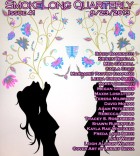First, I’d like for you to tell me there are more stories featuring this narrator. If not, I’d like you to lie to me.
No falsifications necessary, my dear Josh. There’s a whole book called Larissa Takes Flight: Stories and it’s coming out in May. It will be published by Pressgang, an independent press affiliated with the MFA program at Butler University.
This story feels so true, so exactly right, I have to ask if it’s based on anything that actually happened.
As with most fictional pieces, parts of it are true. The seventh grade science teacher at my junior high really did know Neil Armstrong and we were supposed to take a trip to the museum and meet him, but he couldn’t make it that day. I forget whether he was sick or not. For the record, I did not have a crush on Neil and he was not my lab partner, but we were friends and teased each other pretty often.
I think I could read this story every day and not get sick of it. In fact, as I’m writing these questions I’m marveling at your decision to name her crush Neil, the same as the astronaut. How much of this story did you have worked out before you set out to write it?
Neil and Neil are actually both named Neil. I did not make that up.
Many of my Larissa stories just happen—she starts talking, and I start writing. I think I had pieces of this one worked out in my head, but didn’t know exactly what the end note would be.
Right at the end, you lay this line on us: “I watched the back of Neil’s head bobbing, looked at my unsigned postcard, and thought about how long it had taken for Armstrong to get to the moon, how dangerous the trip had been, and how no one knew exactly what the surface of the moon would be like.” For me, this sums up childhood and unrequited love and self-esteem, but it also puts the perfect tonal cap on this brief story. I don’t know how much time has passed since this event and the narrator telling the story, but do you think it’s important that the narrator told this story with the benefit of that elapsed time on her side?
Yes, very much so. I think younger people, kids and pre-teens, often come upon really interesting and sophisticated pieces of knowledge, but they don’t always have the language to express that knowledge and exactly what it means until later. I think the benefit of hindsight also helps us realize how many truths we find early in life and keep returning to again and again.
I bring up this topic a lot, but I don’t believe a writer can fully achieve sadness without also exploring the absurdity of life. To laugh with a character makes you emotionally invested. The humor here feels effortless, tied directly to the voice and to the situation. Did you struggle at all with the tone? What are your thoughts on achieving the desired tone of a story?
Larissa’s voice is tied into my world view and how I think. Sometimes her stories are about what I would do in an ideal world in which I had more guts and were very slightly crazier. She’s a character I invented in large part to play with the voice and tone that comes out naturally when I write. My husband has called her the “distilled essence of Teresa,” which I think is a fairly apt description.



 The SmokeLong Grand Micro Contest (The Mikey) is now an annual competition celebrating and compensating the best micro fiction and nonfiction online.
The SmokeLong Grand Micro Contest (The Mikey) is now an annual competition celebrating and compensating the best micro fiction and nonfiction online.